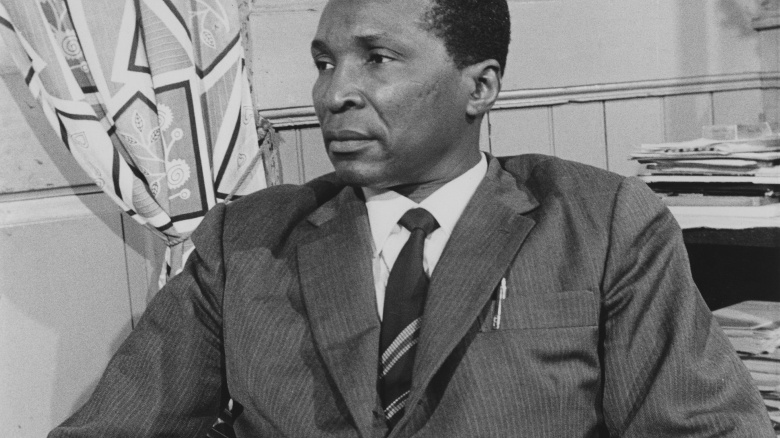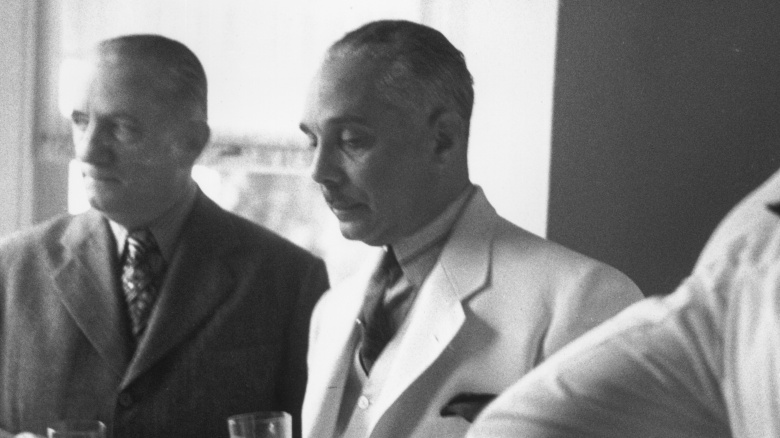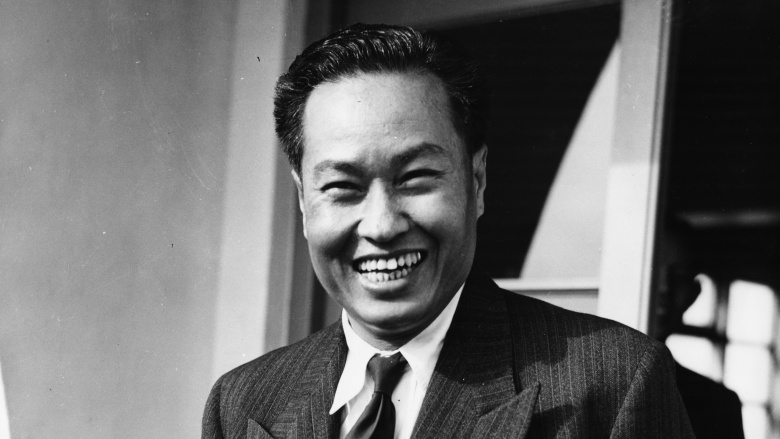World Leaders Who Abused Their Power In Hilarious Ways
"Power corrupts, absolute power corrupts absolutely", so the saying goes, and there's nothing quite like absolute power to bring out the crazy, either. While politicians in most democratic countries will at least try and keep their more peculiar behaviors from spilling into the light of day, when a leader can control the press or simply doesn't have to fear losing his seat in an election, he's free to just let the weird hang right out in the open. And while sometimes, in that context, "weird" means "human rights abuses and war," other times it's just hilarious. Here are a few world leaders who abused their power in the most entertaining ways.
Saparmurat Niyazov
When Turkmenistan suddenly found itself independent after the collapse of the Soviet Union in 1991, former first secretary of the Turkmen communist party, Saparmurat Niyazov, promptly changed his title to President. He eagerly did his best to fill the sizable hole left by the USSR—and by that, we mean he mostly filled it with himself. With the hope of never having to say "do you know who I am?", he gave his name to streets, the month of January, and even a meteorite that happened to fall in the country. He also had the country covered in his likeness with posters and statues, one of which was made of gold and constantly rotated so that it would always face towards the Sun.
But his most impressive act was to write a book called the Ruhnama, to educate the people on Turkmenistan history, morals, and culture. He considered the book so important that applicants for government jobs—and later, even people taking their driving test—were required to pass an exam on the subject. Schools made time for intense study of the book by abandoning "less important" subjects, like physics, algebra, and physical education. Finally, because it was so important to him, Saparmurat had a massive mechanical statue of the book built in the capital city, and every single night it slowly opens and plays recordings and videos for the public.
Francisco Macias Nguema
Francisco Macias Nguema did a lot of crazy stuff after he took control of Equatorial Guinnea, including closing schools and hospitals, persecuting anyone he considered educated or intellectual, banning western medicines in favor of witch doctors, and effectively declaring himself a god—which is definitely one way to interpret absolute power. That his mind wasn't quite running on all cylinders is hard to deny, especially when he would sit down to dinner with eight empty place settings and proceed to engage in conversation with the empty seats. Though this might simply have been because his family was terrible at conversation.
In fact, his sanity was so sketchy, and his belief in the power of witch doctors and magic (especially his own) so complete, that he felt safe to ignore the laws of physics and ban the use of lubricants in the capital city's power station. He declared that he would keep the station running with magic ... and perhaps, in some corner of his mind, it did keep running. Unfortunately for his subjects who lived in the real world, where machinery works best with non-magical lubrication, the power station was badly damaged and the city plunged into darkness. This just goes to show that absolute power is no protection from absolute stupidity, and it definitely won't keep the lights on.
Rafael Trujillo
If you're looking for the poster boy for nepotism, then look no further than former Dominican Republic president, Rafael Trujillo. Admittedly, it's not unusual for someone in power to favor a relative, though they usually try and at least make it look somewhat legitimate. But Trujillo didn't care, happily commissioning his son to the rank of colonel before he was old enough for high school. There are even stories that he tried to get his wife nominated for the Nobel Prize for Literature, despite her lacking any qualifications for the award.
But before nepotism comes egotism, and Trujillo had that in spades as well. So much so that, despite ruling over a brutal dictatorial regime that was responsible for countless deaths, Trujillo went to great lengths to get himself awarded the Nobel Peace Prize, of all things. He even managed to secure fourteen nominations for the prize in 1936, but nevertheless, and unsurprisingly, failed in his bid. It is impossible to tell how near he came to actually being awarded such a prestigious accolade, but let's hope it wasn't even close, because the following year he removed all doubt about his peaceful intentions by ordering the massacre of tens of thousands of Haitians living on his country's border.
Ne Win
Ne Win is another superstitious madman who really shouldn't have been in a position of power. Ruling Burma for 23 years, he had plenty of time get his crazy on, and he certainly made good use of it. Highlights of his crazy resume include: walking backwards across bridges to ward off evil spirits, bathing in dolphin blood, randomly deciding to make cars drive on the right instead of the left (most cars are still right-side driven, even today), and taking his belief in numerology a little too far. Because he believed that the number nine was so lucky, he thought it would be good for the country if money was issued in denominations that were divisible by nine, like 45 and 90, so that's what happened. Unfortunately, since many people didn't use banks, and instead kept their money under the bed, they suddenly found their life savings worth virtually nothing. There's a good reason "better poor than unlucky" isn't something people say.
Kim Jong Il
Before he was the leader of North Korea, Kim Jong Il was something of a movie fanatic. He came to believe that cinema had great propaganda power, and decided to revolutionize the North Korean film industry to capitalize on that. Unfortunately, North Korea being the repressive place it was (and still is), there was really no one there who could be trusted to do the job, and so the future supreme leader of the Democratic People's Republic of Korea hatched a plan to change that.
For some reason, however, simply hiring someone to do it didn't occur to Kim. Instead, he enacted an elaborate scheme to snare the leading film director of South Korea, Shin Sang Ok, by kidnapping his wife. The plan worked, and soon, Kim had his man — over the following years, he produced seven movies. The final, and crowning achievement, was none other than a remake of Godzilla, called Pulgasari. However, in this version, the monster isn't casually laying waste for the hell of it, but rather is the champion of the proletariat and helps overthrow a cruel dictator. Kim loved it, and so did the people apparently (probably because they would've been executed if they did.t). While it has achieved cult status in the West, it's mostly for MST3K-style mockery, not for any reason Kim Jong Il had hoped for.



